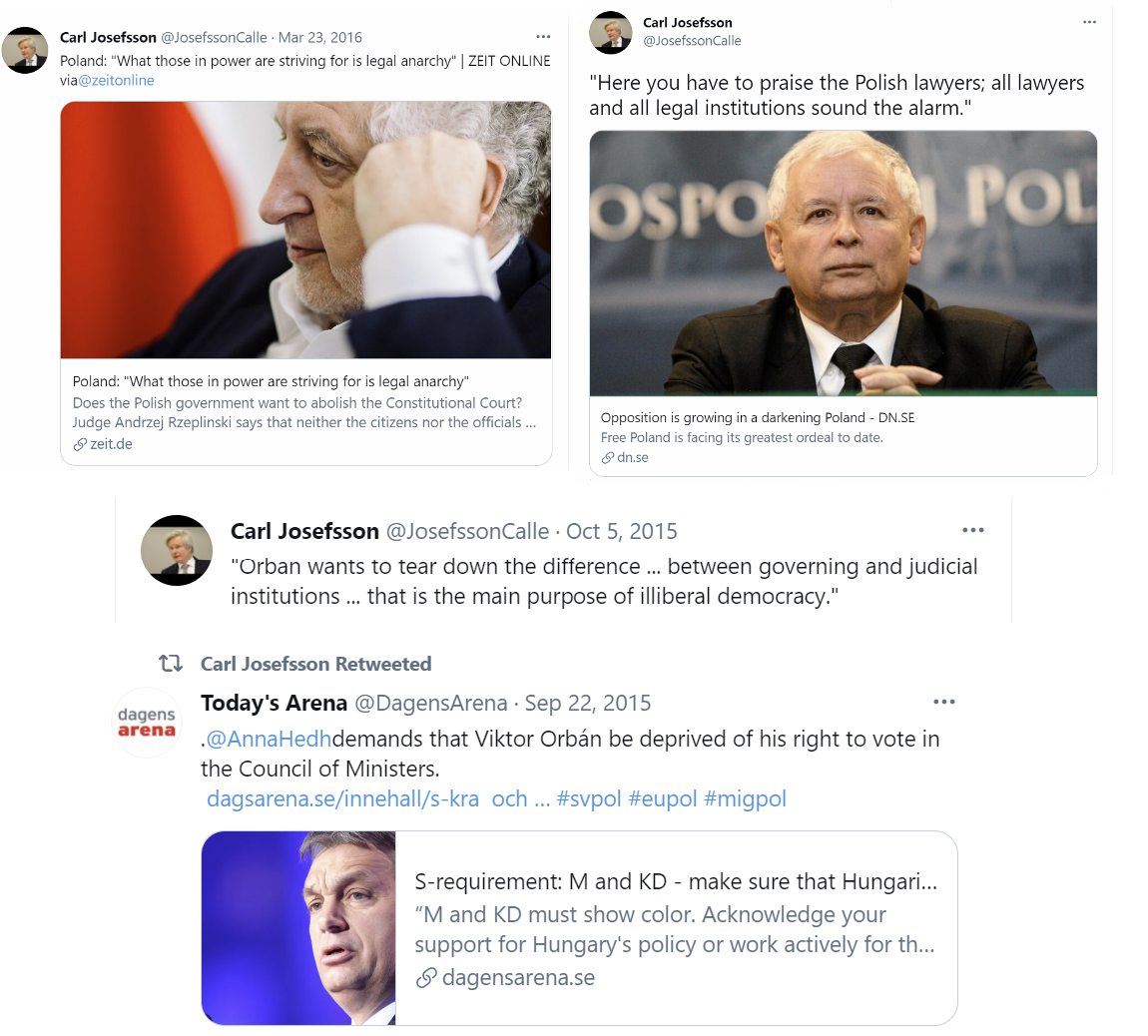

Some tweets from "Calle" Josefsson warning about the dangers of "legal anarchy" in Hungary and Poland.
Following his appointment as a Senior Judge at the Svea Court of Appeal in March 2013, Carl Josefsson started to operate a Twitter account under the username "JosefssonCalle".
"In his contributions to the debates in the SvJT, Josefsson liked to buttress his arguments with references to the theories of the German philosopher and sociologist, Jürgen Habermas."Josefsson was particularly fond of re-tweeting Swedish newspaper articles about attacks on the independence of the judiciary in eastern European countries such as Hungary and Poland.
In addition to this, he posted a number of tweets on the subject of Brexit - or "Borexit" as he liked to call it - including a reference to an article by his favourite philosopher, Jürgen Habermas.
During this time, Josefsson also contributed occasional articles on legal affairs to the Swedish daily newspapers such as the Svenska Dagbladet.
Another forum to which he made regular contributions was the Svensk Juristtidning (SvJT), a specialist legal journal primarily aimed at lawyers. One of his favourite hobby horses here was the role of the courts and the judiciary in a democratic constitutional "rule of law" system.
In his contributions to the debates in the SvJT, Josefsson liked to buttress his arguments with references to the theories of the German philosopher and sociologist, Jürgen Habermas.
"During the Nazi era, Habermas himself was a Jungvolkführer, a leader of the German Jungvolk, which was a section of the Hitler Youth."Habermas who was born in Düsseldorf in 1929 was the son of the executive director of the Cologne Chamber of Industry and Commerce. He later described his father as a “passive sympathiser” with the Nazis and admitted that, as a youth, he had shared that mindset.
During the Nazi era, Habermas himself was a Jungvolkführer, a leader of the German Jungvolk, which was a section of the Hitler Youth.
After the war, Habermas studied philosophy and sociology under the critical theorists Max Horkheimer and Theodor W. Adorno of the "Frankfurt School". He finished his postgraduate studies in political science at the University of Marburg under the Marxist Wolfgang Abendroth.
Habermas became one of the most influential members of the "Frankfurt School" and he enjoyed significant prominence as a public intellectual in the post-war Federal Republic of Germany.
He attempted to develop a revised form of Marxist social theory which was eclectic and able to draw on insights coming from other directions, including Kantian ethics. As an advocate of “networking” and dialogue and a proponent of a robust and transparent civil society, his ideas about democracy and rational decision-making have been influential in many social movements, particularly in left-wing circles in Germany and elsewhere.
"Carl Josefsson's acquaintance with the work of Habermas appears to date from the time of his postgraduate studies in Germany which led to the award of a Master of Laws degree (LL.M) from the Johann Wolfgang Goethe-Universität in Frankfurt in 1995."Habermas proposes a deliberative concept of democracy that focuses on the procedures that exist, or should exist, whereby the ideas and ideals that inform public discourse as well as the decisions that are taken in democratic regimes remain open to debate.
Carl Josefsson's acquaintance with the work of Habermas appears to date from the time of his postgraduate studies in Germany which led to the award of a Master of Laws degree (LL.M) from the Johann Wolfgang Goethe-Universität in Frankfurt in 1995.
In the next part we shall see how the erstwhile critic of "legal anarchy" ended up changing his tune and accommodating himself to the legal "no-man's land" of the EPO. ⬆